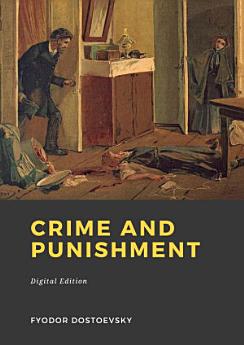Crime and punishment
2023 നവം · Librofilio
ഇ-ബുക്ക്
473
പേജുകൾ
family_home
യോഗ്യതയുണ്ട്
info
reportറേറ്റിംഗുകളും റിവ്യൂകളും പരിശോധിച്ചുറപ്പിച്ചതല്ല കൂടുതലറിയുക
ഈ ഇ-ബുക്കിനെക്കുറിച്ച്
Fyodor Dostoevsky's "Crime and Punishment" is a gripping psychological masterpiece that delves deep into the tormented mind of its protagonist, Raskolnikov, and explores themes of morality, guilt, and redemption.
Set in 19th-century St. Petersburg, Russia, the novel follows the impoverished and intellectually gifted former student, Raskolnikov, who becomes consumed by a radical idea. He believes that by committing a morally justifiable murder of a pawnbroker, he can alleviate his financial woes and prove his superiority over conventional morality. However, the act triggers a relentless inner turmoil.
As the story unfolds, we witness Raskolnikov's descent into paranoia and madness, juxtaposed with the unwavering determination of the shrewd detective Porfiry to solve the crime. The novel masterfully explores the ethical consequences of Raskolnikov's actions and the impact on those around him, including the virtuous Sonia.
Dostoevsky's writing is deeply introspective, drawing readers into the conflicted psyche of his characters. He examines the human condition with profound insight, raising questions about the nature of good and evil, the limits of human suffering, and the possibility of redemption.
"Crime and Punishment" is a literary triumph that continues to captivate readers with its exploration of the darkest corners of the human soul. If you seek a novel that challenges your moral convictions and provides a riveting journey through the complexities of the human psyche, this classic work is an essential read.
Fyodor Dostoevsky, one of Russia's greatest novelists, was born on November 11, 1821, in Moscow. Raised in a family of physicians, he initially studied to follow in their footsteps but soon turned to literature.
ABOUT THE AUTHOR
Fyodor Dostoevsky
Dostoevsky's early works, like "Poor Folk" and "The Double," gained him recognition, but it was his masterpiece, "Crime and Punishment," published in 1866, that catapulted him to literary stardom. This novel delves into the moral and psychological turmoil of its protagonist, Raskolnikov, making it a timeless exploration of guilt and redemption.
His other notable works include "The Idiot," "Demons" (also known as "The Devils" or "The Possessed"), "The Brothers Karamazov," and "The Gambler." These novels grapple with complex philosophical and psychological themes, earning Dostoevsky a reputation as a master of psychological fiction.
Dostoevsky's life was marked by personal struggles, including brushes with death, imprisonment in Siberia, and financial woes. Despite these challenges, his literary output remained prolific, and he continued to shape Russian literature.
He passed away on February 9, 1881, in Saint Petersburg, leaving behind a literary legacy that explores the depths of the human soul and the complexities of human nature. His works continue to be celebrated worldwide for their profound insights into the human condition.
Set in 19th-century St. Petersburg, Russia, the novel follows the impoverished and intellectually gifted former student, Raskolnikov, who becomes consumed by a radical idea. He believes that by committing a morally justifiable murder of a pawnbroker, he can alleviate his financial woes and prove his superiority over conventional morality. However, the act triggers a relentless inner turmoil.
As the story unfolds, we witness Raskolnikov's descent into paranoia and madness, juxtaposed with the unwavering determination of the shrewd detective Porfiry to solve the crime. The novel masterfully explores the ethical consequences of Raskolnikov's actions and the impact on those around him, including the virtuous Sonia.
Dostoevsky's writing is deeply introspective, drawing readers into the conflicted psyche of his characters. He examines the human condition with profound insight, raising questions about the nature of good and evil, the limits of human suffering, and the possibility of redemption.
"Crime and Punishment" is a literary triumph that continues to captivate readers with its exploration of the darkest corners of the human soul. If you seek a novel that challenges your moral convictions and provides a riveting journey through the complexities of the human psyche, this classic work is an essential read.
Fyodor Dostoevsky, one of Russia's greatest novelists, was born on November 11, 1821, in Moscow. Raised in a family of physicians, he initially studied to follow in their footsteps but soon turned to literature.
ABOUT THE AUTHOR
Fyodor Dostoevsky
Dostoevsky's early works, like "Poor Folk" and "The Double," gained him recognition, but it was his masterpiece, "Crime and Punishment," published in 1866, that catapulted him to literary stardom. This novel delves into the moral and psychological turmoil of its protagonist, Raskolnikov, making it a timeless exploration of guilt and redemption.
His other notable works include "The Idiot," "Demons" (also known as "The Devils" or "The Possessed"), "The Brothers Karamazov," and "The Gambler." These novels grapple with complex philosophical and psychological themes, earning Dostoevsky a reputation as a master of psychological fiction.
Dostoevsky's life was marked by personal struggles, including brushes with death, imprisonment in Siberia, and financial woes. Despite these challenges, his literary output remained prolific, and he continued to shape Russian literature.
He passed away on February 9, 1881, in Saint Petersburg, leaving behind a literary legacy that explores the depths of the human soul and the complexities of human nature. His works continue to be celebrated worldwide for their profound insights into the human condition.
ഈ ഇ-ബുക്ക് റേറ്റ് ചെയ്യുക
നിങ്ങളുടെ അഭിപ്രായം ഞങ്ങളെ അറിയിക്കുക.
വായനാ വിവരങ്ങൾ
സ്മാർട്ട്ഫോണുകളും ടാബ്ലെറ്റുകളും
Android, iPad/iPhone എന്നിവയ്ക്കായി Google Play ബുക്സ് ആപ്പ് ഇൻസ്റ്റാൾ ചെയ്യുക. ഇത് നിങ്ങളുടെ അക്കൗണ്ടുമായി സ്വയമേവ സമന്വയിപ്പിക്കപ്പെടുകയും, എവിടെ ആയിരുന്നാലും ഓൺലൈനിൽ അല്ലെങ്കിൽ ഓഫ്ലൈനിൽ വായിക്കാൻ നിങ്ങളെ അനുവദിക്കുകയും ചെയ്യുന്നു.
ലാപ്ടോപ്പുകളും കമ്പ്യൂട്ടറുകളും
Google Play-യിൽ നിന്ന് വാങ്ങിയിട്ടുള്ള ഓഡിയോ ബുക്കുകൾ കമ്പ്യൂട്ടറിന്റെ വെബ് ബ്രൗസർ ഉപയോഗിച്ചുകൊണ്ട് വായിക്കാവുന്നതാണ്.
ഇ-റീഡറുകളും മറ്റ് ഉപകരണങ്ങളും
Kobo ഇ-റീഡറുകൾ പോലുള്ള ഇ-ഇങ്ക് ഉപകരണങ്ങളിൽ വായിക്കാൻ ഒരു ഫയൽ ഡൗൺലോഡ് ചെയ്ത് അത് നിങ്ങളുടെ ഉപകരണത്തിലേക്ക് കൈമാറേണ്ടതുണ്ട്. പിന്തുണയുള്ള ഇ-റീഡറുകളിലേക്ക് ഫയലുകൾ കൈമാറാൻ, സഹായ കേന്ദ്രത്തിലുള്ള വിശദമായ നിർദ്ദേശങ്ങൾ ഫോളോ ചെയ്യുക.








